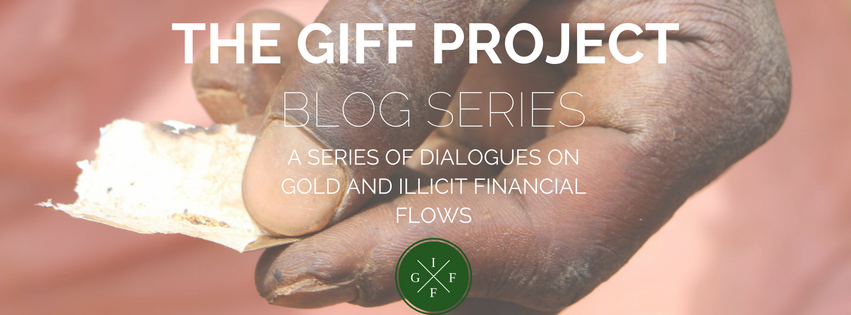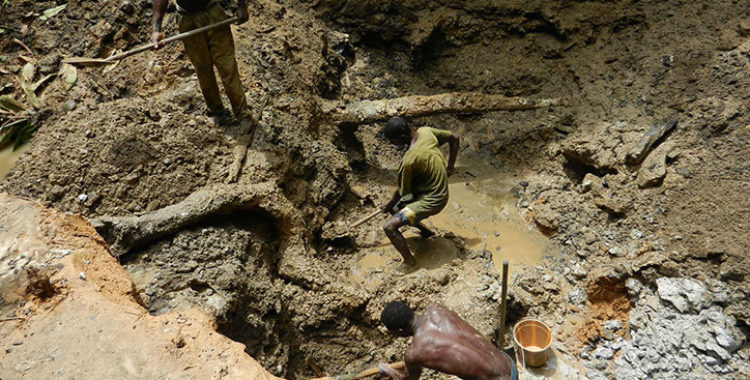
In this blog, I want to present the downstream perspective about illicit financial flows of artisanal gold, as informed by refiner-focused due diligence systems and downstream expectations—and especially whether and how artisanal gold from conflict-affected areas assimilates in these systems and meets such expectations.
As one illustration of the evolution of downstream engagement in artisanal gold, I will highlight some of the challenges experienced by members of the Responsible Artisanal Gold Solutions (RAGS) Forum in the last year as they tried to support the establishment of artisanal gold supply chains and implementation of due diligence in the ASM gold sector.
The three pillars of the Conflict Free Sourcing Initiative (CFSI)
The Conflict Free Sourcing Initiative, a downstream industry program, looks at three different pillars of responsible sourcing. Firstly, it makes sure that whatever systems it develops allow legitimate (i.e. conflict-free) sources of minerals from conflict-affected areas to have access to the global market.
The CFSI does that by looking at the refinery level in the supply chain, which is the pinch point. They’ve identified the refiners (gold) and smelters (tin, tantalum and tungsten) that are associated with the various conflict minerals as a finite and manageable number.
The second pillar of the CFSI is the audit program that was developed to look at the procurement practices of the refiners and understand where they are sourcing from. Based on that, on a multi-stakeholder developed protocol, smelters and refiners then get identified as conflict-free if they conform to the requirements. This allows companies to look at the source of their material, at least from a refiner level, to make sourcing decisions, or to at least understand if they are sourcing responsibly.
The third pillar of the program is about access and communication of information throughout the downstream supply chain. One of the earlier studies undertaken by industry highlighted the lack of significant information transparency within most global supply chains. The CFSI thus created a tool that allows for supplier-customer communication—from the refiner to the end user of that material.
Conflict-free smelters and refiners
At the moment, gold is one of the minerals the CFSI looks at. There are over 80 compliant conflict-free refiners that have been validated. One of the challenges that industry faced was the similarity between several existing programs, such as the RJC and the LBMA, with regards to gold. There is therefore mutual recognition between the responsible sourcing standards of these two organisations and the CFSI to recognise the conflict minerals component of one another’s programs.
Of those 80 refiners, 14 are CFSI compliant, while the others are either LBMA or RJC compliant. CFSI data includes origin information, whereas the LBMA and RJC, at this moment in time, do not disclose country of origin information. The omission of country of origin information does not mean the minerals are conflict-affected; the refiner is verified as conflict-free but for commercial reasons they do not disclose this data. Sixty-six refiners are RJC and LBMA certified, meaning that industry has an opportunity to understand where the refiners are sourcing from, and can consequently drive actors in their supply chains to source from those conflict-free refiners.
CFSI has identified at least 141 of the major gold refiners that exist out there, but not all are in a third party audit program. There had been discussions with the DMCC regarding mutual program recognition, but that has not as yet happened; however, the DMCC does have mutual recognition with the RJC.
Illicit Financial Flows – the downstream perspective and challenges faced
Illicit financial flows for a lot of downstream companies are not on their radar with regard to gold. US companies rely on programs they have established to deal with the Foreign Corruption Practices Act to address illicit financial flows.
There are various downstream companies that are trying to help pull materials through the supply chain. For example, there is the Responsible Artisanal Gold Solutions forum. It has a couple of downstream participants, including Signet and Richline – two of the largest jewellery retailers and manufacturers, respectively, in the world.
The Forum aims to support the formation of a closed pipe system that sources artisanally mined, conflict-free gold from the DRC and allows the material to enter into the downstream participants’ supply chain. The upstream participants and implementers (Tetra Tech and Partnership Africa Canada) have led the development of the supply; now the Forum is helping to create linkages with downstream partners and to facilitate the key aspects of due diligence that must be addressed before commercial arrangements can be pursued.
Downstream industry representatives are, however, experiencing challenges with that system. Both the Just Gold project that Partnership Africa Canada is working on, and the Matete project that is run by the USAID-funded CBRMT project, are part of the RAGS Forum. In relation to closed-pipe programs, Just Gold was able to set up the mine and get it to the point where it is operating and selling to an exporter.
The link between this exporter and a refiner is still missing, although significant work and discussions are underway with multiple refiners. In order to meet the downstream needs, a refiner will have to be LBMA Good Delivery or RJC-certified to be eligible to procure and process the gold. This requires a refiner to conduct due diligence as defined by the LBMA and consistent with the OECD Due Diligence Guidance. The cost to do due diligence at the artisanal level, when governments lack the capacity to both monitor ASM operations and reduce risks in the operating environment (like child labour, human trafficking, bribery, and corruption), is very high and the risks may be significant.
Translating due diligence requirements for an artisanal environment has proven challenging, though progress is being made. Further, between the high cost of due diligence and the small volumes mined, industry is finding it very difficult to build the business case. Given very small volumes of minerals being produced at ASM gold pilot mine sites (and other government-approved sites) in the DRC, it’s extremely challenging for the refiner to justify the transaction costs associated with conducting appropriate due diligence to protect their interests and minimise their risk. Furthermore, the logistics of moving the gold from the DRC to a refiner are very expensive and problematic.
Certainly, there are brand reputation issues to consider, and you may get a slight premium for responsibly mined gold out of these areas, but it is quite challenging.
What’s next?
RAGS will continue to look at finding and aligning refiners that are willing to help work through some of these issues, and to hopefully scale up to the volumes that would be needed for a truly viable project.
Unfortunately, those are just some of the challenges—trying to find both an exporter/producer that can pass due diligence in the region, and a refiner that is willing to form a business relationship with this entity in order to process the material.
The Forum is looking at addressing these issues to help support responsible sourcing of artisanal gold.
Members are developing a KYC Toolkit to support refiners, exporters, and miners/pilot operators in conducting due diligence from the site to the refiner in a way that cost effectively meets LBMA and OECD requirements. The Forum is also committed to shared learning and plans to release a “Year 1 Lessons Learned” document in the next month, which will be available on its website.
The GIFF Project is thus an invaluable opportunity. If the tools can help drive down the risk and due diligence cost, it would enable more ASM-produced conflict-free gold to enter the global market, offering international access, which is critical.
Mike Loch is the President of Responsible Trade, LLC. He has over 25 years of experience in the mining industry, and is a recognised expert in sustainability. He was a member of the Governance Committee of the Public Private Alliance for Responsible Minerals Trade, served as co-chair of the Conflict Free Sourcing Initiative for more than seven years, has been active in development of the OECD Due Diligence Guidance and served as the industry representative on the OECD Forum’s Multi-Stakeholder Steering Group. Mike led the development and launch of the Solutions for Hope project.
The GIFF Project is a joint initiative with the Global Initiative against Transnational Organised Crime. It enables practitioners to investigate and map financial flows linked to the ASM gold sector and strengthen programme design and policy formulation.



